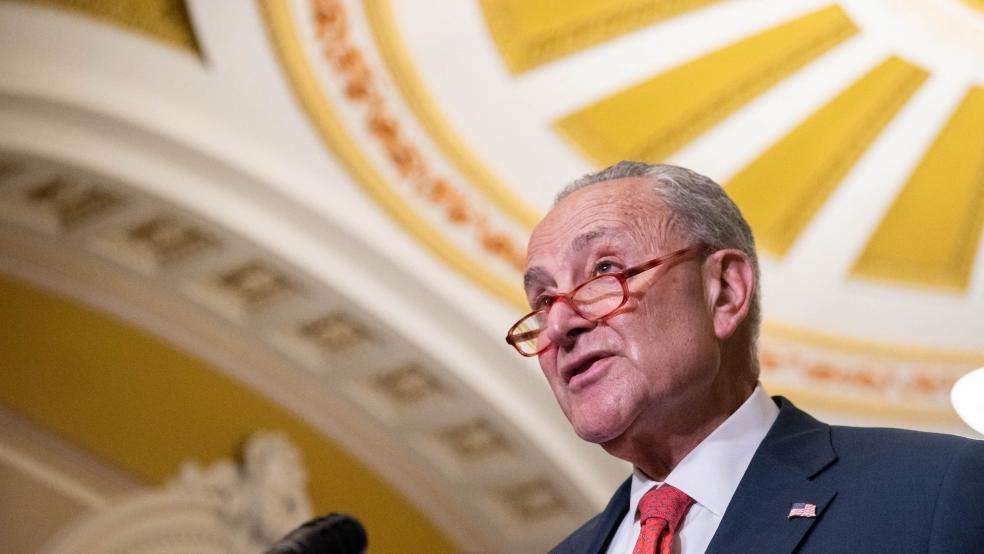Top Democratic and Republican Senate appropriators expressed support Tuesday for the White House’s $106 billion emergency funding request including assistance to both Israel and Ukraine, signaling that the Senate might be headed for a clash with House Republicans who this week left out aid to Kyiv from an aid plan they want to vote on this week.
New House Speaker Mike Johnson of Louisiana has made clear he intends to “bifurcate” the emergency assistance and allow his members to vote on each aid request separately — an approach the Biden administration warns would undermine the Ukrainian effort against Russia. The House plan also proposes to cut IRS funding to offset the emergency spending. “The House GOP leadership team considered a host of bipartisan pay-fors, but opted to cut IRS money with hopes of dividing Democrats and solidifying GOP support,” Punchbowl News reported Tuesday.
Senate Majority Leader Chuck Schumer criticized the House plan. “I am deeply troubled that yesterday, House Republicans released a partisan and woefully inadequate package with no aid to Ukraine, no humanitarian assistance for Gaza, no funding for the Indo-Pacific, and in addition, poison pills that increase the deficit and help wealthy tax cheats avoid paying their fair share,” he said in remarks on the Senate floor. “In short, it makes it much, much harder to pass aid for Israel. It’s insulting that the hard right is openly trying to exploit the crisis in Israel to try and reward the ultra-rich.”
‘This is all one fight’: The White House’s requested security funding package includes $61.4 billion for Ukraine, $14.3 billion for Israel, $13.6 billion for U.S. border security, $11.2 billion in humanitarian aid and more than $5 billion for allies in the Indo-Pacific region.
At a hearing of the Senate Appropriations Committee on Tuesday, Secretary of State Antony Blinken and Secretary of Defense Lloyd Austin III testified that the Biden administration’s request is urgent and should move forward as a single package to help preserve U.S. global leadership.
“We now stand at a moment where many are again making the bet that we’re too divided, we’re too distracted at home to stay the course. That’s what’s at stake with President Biden’s national security supplemental funding request,” Blinken said during testimony that was interrupted repeatedly by anti-war protestors.
He later added: “To put it succinctly, for our adversaries—be they states or non-states—this is all one fight. And we have to respond in a way that recognizes that. If we start to peel off pieces of this package, they’ll see that, they’ll understand that we are playing whack-a-mole while they cooperate increasingly and pose an ever-greater threat to our security as well as to that of our allies and partners.”
Bipartisan backing in the Senate: Democrats and Republicans on the panel backed the idea of quickly passing a combined aid package, though some Republicans also called for additional funding for border security.
Democratic Sen. Patty Murray of Washington, who chairs the Appropriations panel, agreed that the aid needs are intertwined. “Make no mistake: We need to address all of these priorities as part of one package—because the reality is these issues are all connected, and they are all urgent,” she said in her opening remarks. “The Chinese government is watching how we respond to Putin’s aggression in Ukraine. Putin is hoping the Hamas attack will give him an opening and distract the world from aiding Ukraine against his brutal invasion, and all of our adversaries are watching closely to see whether we have the vision to recognize how these crises are related, and the resolve to come together and respond forcefully to them. Our adversaries are cheering for dysfunction. So let’s instead show them unity.”
Republicans remain divided over additional aid to Ukraine, though most GOP senators reportedly favor providing more funding. Senate Minority Leader Mitch McConnell has been vocal in calling for continued support for Kyiv and did so again on Tuesday. And Sen. Susan Collins of Maine, the top Republican on the Appropriations Committee, also joined in calling for a combined package. “Some have argued for decoupling funding to address these threats, and focusing only on the Iranian-backed terrorists, who massacred so many Israelis on October 7,” she said. “We must recognize that our national security interests are being aggressively challenged by all these authoritarian actors in an effort to dismantle the international order that we established following World War II.”
Collins also emphasized that she and Murray plan to pass all 12 annual appropriations bills. “As former Secretary of Defense Bob Gates once told me, the most important action Congress can take to bolster our national security is to pass full-year appropriations bills to avoid the harm to military readiness that comes from short-term funding patches or sequestration,” she said.
The bottom line: The administration’s request has bipartisan support in the Senate, meaning that a showdown with the House GOP is likely coming soon.





